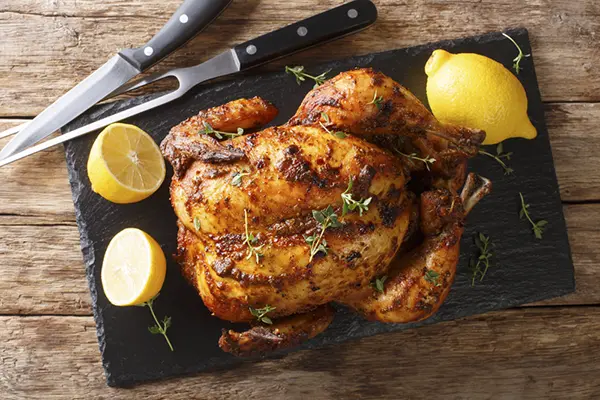
Can dogs eat rotisserie chicken? It’s a question that has dog owners drooling over the possibilities of sharing their favorite juicy and flavorful meal with their furry companions. Imagine those pleading puppy eyes staring up at you, hoping for a savory bite. Well, the good news is that dogs can indeed indulge in rotisserie chicken, but there are a few important points to chew on.
Can Dogs Eat Rotisserie Chicken?
Yes, dogs can generally eat rotisserie chicken in moderation. Plain, cooked chicken without seasoning or excessive added fats can be a safe and healthy protein source for dogs. However, it’s important to remove the skin and bones before feeding it to your dog. The skin is often high in fat and may be seasoned with herbs or spices that can be harmful to dogs. Bones, especially cooked bones, can splinter and pose a choking hazard or cause injury to the digestive tract.
When feeding rotisserie chicken to your dog, it’s best to offer it as a treat or mix it with their regular dog food in small portions. Ensure that the chicken is properly cooked and free from any seasoning, sauces, or added ingredients that may be harmful to dogs, such as onions or garlic.
It’s always a good idea to consult with your veterinarian before introducing any new food to your dog’s diet, including rotisserie chicken, especially if your dog has any existing health conditions or dietary restrictions.
Related Post: Can Dogs Eat Acai? Exploring the Safety and Benefits
What is Rotisserie Chicken?

Rotisserie chicken is a mouthwatering dish that involves grilling a whole chicken with simple seasonings and intermittent basting. The result is a flavorful and tender meat with crispy, golden skin. It has gained popularity due to its convenience and versatility.
To prepare rotisserie chicken, a whole chicken is seasoned with basic spices, such as salt, pepper, and paprika. It is then secured on a rotisserie skewer and slowly cooked on a grill or in an oven. The rotation of the chicken ensures even cooking and helps to retain the meat’s juiciness.
The end product can be enjoyed as the main course, paired with classic accompaniments like French fries and coleslaw, or served with a variety of other side dishes. Additionally, leftover rotisserie chicken can be used in numerous recipes, including salads, sandwiches, soups, or stir-fries, providing a convenient and flavorful protein source.
Rotisserie chicken has become a popular choice for busy individuals and families looking for a delicious and time-saving meal option. Its succulent meat, enhanced by the smoky flavors from the grill, makes it a versatile and satisfying choice for any occasion.
Related Post: Can Dogs Eat Couscous? How Much Is Safe?
Is Eating Rotisserie Chicken Healthy For Dogs?
Eating rotisserie chicken in moderation can be a healthy addition to a dog’s diet. Rotisserie chicken is a good source of lean protein, which is essential for muscle development and overall health in dogs. It also provides essential amino acids and nutrients like vitamins B6 and B12, niacin, and selenium.
However, it’s important to consider a few factors. First, make sure the chicken is plain and free from seasonings, spices, or added ingredients that can be harmful to dogs. Seasonings like onion and garlic can be toxic to dogs and should be avoided. Additionally, remove the skin and bones before feeding the chicken to your dog. The skin is high in fat and may cause digestive upset, while bones can splinter and pose a choking hazard or cause internal injuries.
Portion control is key. While chicken can be a healthy treat, it should not make up a significant portion of your dog’s diet. It’s important to maintain a balanced diet with a variety of nutrients from other sources, such as commercial dog food.
As always, it’s best to consult with your veterinarian before making any changes to your dog’s diet, including incorporating rotisserie chicken. They can provide personalized guidance based on your dog’s specific needs and health conditions.
Related Post: Can Dogs Eat Durian Safely?
Risks of Feeding Rotisserie Chicken to Dogs
While rotisserie chicken can be a tasty treat for dogs, there are certain risks associated with feeding it to them. Here are a few potential risks to consider:
- Seasonings and Ingredients: Rotisserie chicken often contains seasonings, herbs, or spices that can be harmful to dogs. Ingredients like onions, garlic, and excessive salt can be toxic and may lead to health issues such as anemia or digestive upset.
- High Fat Content: The skin of rotisserie chicken is usually high in fat, which can be difficult for dogs to digest and may lead to gastrointestinal problems. Consuming excessive fat can also contribute to obesity in dogs, which can lead to other health complications.
- Bones: The bones in rotisserie chicken can pose a serious risk to dogs. Cooked bones can splinter and cause choking hazards or internal injuries if ingested. It is crucial to remove all bones before feeding chicken to your dog.
- Imbalanced Diet: While rotisserie chicken can be a source of protein, it should not replace a balanced diet specifically formulated for dogs. Dogs require a variety of nutrients from different food sources, including carbohydrates and vegetables, to meet their dietary needs. Relying solely on rotisserie chicken can lead to nutritional deficiencies.
To ensure your dog’s safety, it’s always best to consult with a veterinarian before introducing any new food into their diet. They can provide personalized advice based on your dog’s specific health condition and dietary requirements.
Conclusion
While rotisserie chicken can be a tempting treat for dogs, it’s important to be aware of the potential risks associated with feeding it to them. The seasonings and ingredients commonly found in rotisserie chicken, such as onions, garlic, and excessive salt, can be toxic to dogs and should be avoided. Additionally, the high fat content in the chicken skin can lead to digestive issues and contribute to obesity. The bones in rotisserie chicken pose a serious choking and injury hazard.
It’s crucial to remove all bones before offering chicken to your furry friend. Remember, rotisserie chicken should not replace a balanced diet specifically formulated for dogs, as they require a variety of nutrients from different food sources. As always, consulting with a veterinarian is the best course of action to ensure the safety and well-being of your dog. They can provide guidance tailored to your dog’s individual needs and help you make informed decisions about their diet. By being aware of these risks, you can keep your canine companion healthy and happy.
Related Post:



